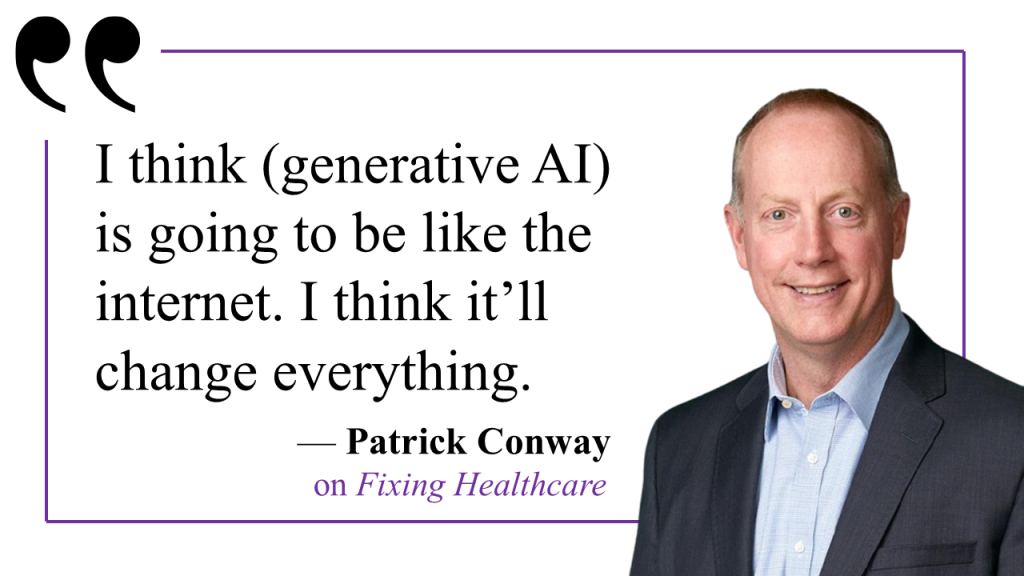Podcast: Play in new window | Download
Subscribe: Spotify | Email | RSS | More
FHC #186: From rare diseases to rural America, Optum’s CEO talks healthcare’s future
In this special return to Season 10, which focused on transformative technologies in medicine, Fixing Healthcare hosts Dr. Robert Pearl and Jeremy Corr interview Dr. Patrick Conway, CEO of Optum, a $250 billion division of UnitedHealth Group. A pediatrician and former CMS leader, Dr. Conway has spent his career driving innovation at the intersection of medicine, policy and business.
Conway argues that healthcare stands on the brink of a transformation driven by artificial intelligence, breakthrough therapies, prevention strategies and big data analytics. As CEO of Optum (one of the most influential players in U.S. medicine, employing over 310,000 people worldwide), Conway explains how his organization is using technology and integration to improve quality, lower costs and expand equity.
Here are five key insights from the episode:
- AI will be like the internet: changing everything.
Conway predicts generative AI will rapidly move beyond administrative tasks into clinical decision-making, diagnosis and personalized training for physicians. He shares a story of diagnosing a child’s rare disorder and imagines how AI could make such insights instantaneous for every doctor. - Prevention is the ultimate cost-saver.
Chronic disease prevention, he says, is America’s greatest healthcare challenge. Apps, gamification and continuous monitoring could replace the outdated “come back in four months” model. Managing hypertension and diabetes in real time could radically lower costs and improve lives. - Big data enables personalized care at scale.
Optum uses analytics to stratify patients (such as “dual eligibles” living with multiple chronic conditions) and deliver tailored interventions at home. Conway recounts how one 91-year-old patient, once hospitalized eight times a year, went to zero admissions after joining Optum at Home. - Value-based care must expand faster.
Optum already assumes full financial risk for 5 million patients, but Conway argues the majority of Americans deserve this model. Capitation aligns incentives around outcomes, quality and cost, and generative AI could accelerate its adoption, even in rural communities. - Drug costs remain unsustainable.
Here, Conway is blunt. U.S. drug prices are too high, with GLP-1 drugs costing eight to 10 times more than abroad. Optum has committed to 100% rebate pass-through. It has also eliminated many prior authorizations and shifted its entire pharmacy business to lower-cost generics and biosimilars.
After the interview, Dr. Pearl tells Corr that he was struck by the Optum CEO’s optimism about generative AI and its role in reshaping healthcare, noting that Conway sees beyond administrative savings to its potential for improving clinical outcomes and managing chronic disease. Pearl noted Conway’s clear commitment to capitation and value-based care; what Pearl called his “North Star.” Pearl concluded that Conway is a mission-driven leader, highly capable of pushing UnitedHealth Group to accelerate change, and urged him to move faster than feels comfortable in scaling prevention, AI and integrated care.
* * *
Fixing Healthcare is a co-production of Dr. Robert Pearl and Jeremy Corr. Subscribe to the show via Apple, Spotify, Stitcher or wherever you find podcasts. Join the conversation or suggest a guest by following the show on Twitter and LinkedIn.

